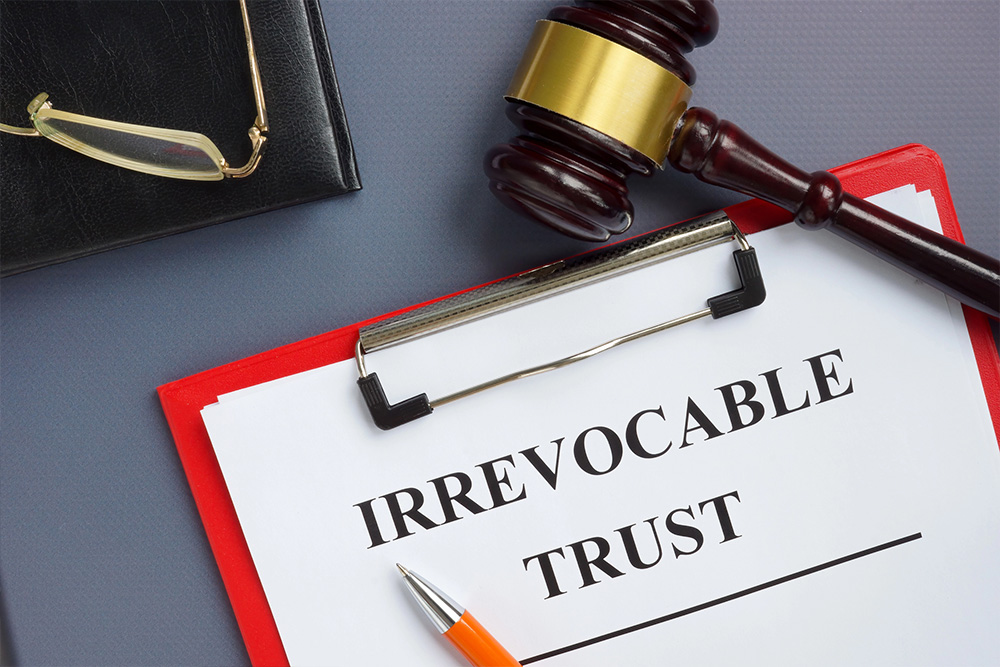When establishing a trust, a key question that arises is who owns the property in an irrevocable trust. It is important to have a clear understanding of ownership, control, and tax obligations. In this article, we will explain how ownership functions when assets are placed into an irrevocable trust and clarify who is responsible for paying the taxes on that property.
What Is an Irrevocable Trust?
An irrevocable trust allows you to permanently transfer ownership of property into a trust, which means the terms cannot be altered or canceled once established. This action is typically taken to protect assets, remove them from your personal estate, or meet tax or planning goals.
After placing property in an irrevocable trust, you no longer hold legal title in the same manner. The trust has a specific structure that includes a trustee to manage the property, beneficiaries to receive benefits, and trust terms that outline how everything operates.
Who Holds Legal Title?
Once property is transferred into an irrevocable trust, the trustee holds legal title to it. As a fiduciary, the trustee must adhere to the terms laid out in the trust. While you may influence the selection of the trustee or outline instructions, you lose direct control over the property.
The trustee’s name is listed on deeds or titles for real estate or ownership records for other assets, thus shifting legal ownership. You may retain beneficial interest if the trust permits it. This means you may receive benefits such as income from an asset or a future distribution, but legally, the trustee holds title to the property.
Why Legal Title Matters for Protection
Because the trustee holds legal title, the property is no longer part of your personal estate. A creditor or lawsuit plaintiff cannot claim the property directly since you no longer have legal ownership. Though challenges to the trust or claims of excessive control may occur, the trust’s structure is designed to stand firm.
Since you cannot unilaterally change or reclaim the property, it strengthens the case that the trust holds the asset outside your reach.
Who Pays Property Taxes?
Once the trust holds ownership, someone must pay taxes on the property. The answer depends on the type of tax and how the trust is taxed under the law.
For real estate, property taxes generally stay tied to the property. The trustee, acting under trust authority, issues a payment. If trust income arises, such as rent from a property, the trust may report that income and pay income taxes unless distributions shift the tax burden to beneficiaries.
If the trust is treated as a separate taxpayer, it files its own income tax return, reports income, deductions, and pays tax on retained amounts. If the trust gives out distributions, beneficiaries may report that income on their returns and pay the corresponding tax.
The trust agreement may dictate this shifting of the tax burden. In short, the trustee handles tax filings, issues payments, and reports based on how the trust is taxed.
Grantor Trust Versus Non-Grantor Trust
The tax treatment of a trust varies depending on whether it is a grantor or non-grantor trust. In a grantor trust, the settlor (you) is treated as the owner for income tax purposes. This means you continue to report income or loss even after the property is placed in the trust.
The trustee files a trust return only when required, but the tax burden remains with you. In this case, while legal title is with the trust, you still bear the income tax responsibility.
On the other hand, in a non-grantor trust, the trust itself pays taxes on retained income. If the trust distributes income, beneficiaries report and pay taxes on the amounts they receive. The trustee must manage tax filings, apply deductions, and coordinate with beneficiaries on the tax responsibilities.
Who Pays Capital Gains Tax When Property Sells?
When the trustee sells trust property, capital gains tax applies. In a grantor trust, you report the gain on your personal return. In a non-grantor trust, the trust itself pays tax on gains retained within the trust. If gains pass through to beneficiaries, those individuals recognize and pay tax on their share.
The tax rate depends on holding period, your income bracket, and trust tax rules. If the trust holds property long enough to qualify for favorable long-term capital gain rates, the trustee must file accordingly. The trust documents can assign responsibility for tax payments and may require the trust to distribute funds to beneficiaries so they can meet their tax obligations.
State and Local Taxes
In addition to federal taxes, state property taxes, recording fees, transfer taxes, or real property gains taxes may also apply. The trustee is responsible for fulfilling these obligations because the trust holds legal title.
Income generated by the trust may also be subject to state income taxes, depending on the jurisdiction where the trust is administered or where the beneficiaries reside. As with other taxes, the trustee manages the filings and payments, or the tax burden may be passed to the beneficiaries based on the terms of the trust.
Risks of Retaining Control
If you retain too much control over trust property, even in an irrevocable trust, a court might reassign ownership back to you.
For instance, if you dictate day-to-day decisions or act like the trustee, legal counsel may argue the trust is a sham. That undermines property protection and may force you to pay creditors or taxes as though the trust did not exist.
To avoid that risk, the trust document must create a clean separation between your role and the trustee’s role. Once the property is in the trust, you should refrain from intervening in decisions. The trustee should operate independently, follow your instructions only through clear terms, and maintain arm’s-length practices.
With proper design, the trust stands legally sound, property ownership shifts to the trustee, and tax responsibilities flow as the plan dictates.
If you would like to explore a trust tailored to your situation, do not hesitate to contact us.





